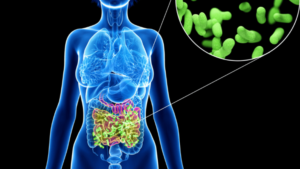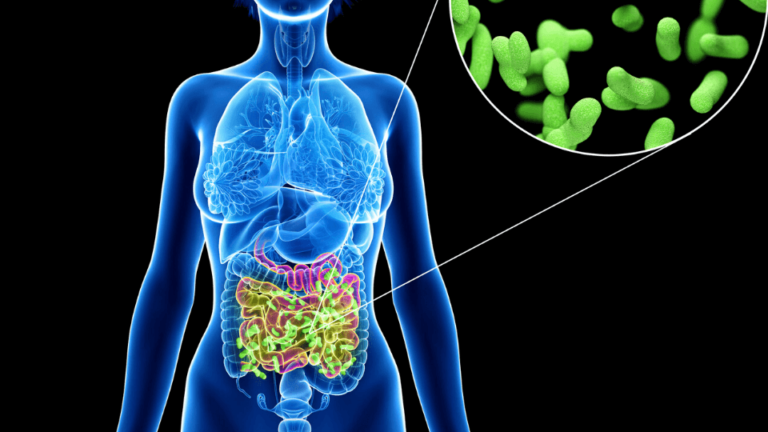The human body is one complex ecosystem with trillions of micro-organism inhabitants, collectively referred to as the microbiome. We could not live without this massive colony of bacteria. This human microbiome is in our eyes, skin, digestive and respiratory systems. The largest colony of microbes in our body reside in our digestive system. The gut (gut flora) and its functions are extremely complex.
Gut Flora
 The gut flora are made up of essential, opportunistic and transitional microbes.
The gut flora are made up of essential, opportunistic and transitional microbes.
- Beneficial (essential) flora: The most important and most abundant microbes (bacteria) found in a “healthy” individual.
- Opportunistic flora: Microbes that have various functions in different combinations. In an environment of a compromised immune system, these microbes can cause health problems.
- Transitional flora: These are consumed daily through environmental toxins and processed food. If damaged they can lead to disease.
Note: About 80% of our immune system is located in our gut. As a result, a healthy immune system is dependent on a healthy balance of microbes in the gut flora.
What can negatively affect the gut flora?
Many factors can affect the gut flora. Factors include childbirth, antibiotics, processed foods, certain diseases, stress, and environmental factors.
- Antibiotic medications, although sometimes necessary to combat bacterial infections, can significantly impact the gut flora.
- Approximately 80% of the American diet consists of processed foods which creates a negative impact on the gut flora.
- Stress takes a mental and physical toll on the body and can negatively change the gut flora.
How to Establish a Healthy Gut?
One of the most important things that will restore gut health is to address any factors that are inhibiting stomach acid production. Stomach acid is important in the digestion of foods and absorption of nutrients. One of the strategies we use at BTF is to supplement with Betaine Hydrochloric Acid (HCL) and Pepsin.
 Once you get your stomach acid restored in your gut, the next step is to ensure adequate digestive enzyme levels. Digestive enzymes are substances that help you digest your food. They are secreted (released) by the salivary glands and cells lining the stomach, pancreas, and small intestine. Digestive enzymes do this by splitting the large, complex molecules that make up proteins, carbohydrates, and fats into smaller ones. This allows the nutrients from these foods to be easily absorbed into your blood and carried through your body. There are several digestive enzymes, including amylase, maltase, lactase, lipase, sucrase, and proteases. For some of our clients we recommend a Digestive Enzyme Supplement.
Once you get your stomach acid restored in your gut, the next step is to ensure adequate digestive enzyme levels. Digestive enzymes are substances that help you digest your food. They are secreted (released) by the salivary glands and cells lining the stomach, pancreas, and small intestine. Digestive enzymes do this by splitting the large, complex molecules that make up proteins, carbohydrates, and fats into smaller ones. This allows the nutrients from these foods to be easily absorbed into your blood and carried through your body. There are several digestive enzymes, including amylase, maltase, lactase, lipase, sucrase, and proteases. For some of our clients we recommend a Digestive Enzyme Supplement.
The third potential supplementation strategy we consider for clients with gut issues at BTF comes in the form of pre- and pro-biotics. Both prebiotics and probiotics are important for human health. However, they have different roles:
- Probiotics are live bacteria found in certain foods or supplements. They can provide numerous health benefits.
- Prebiotics come from types of carbohydrates (mostly fiber) that humans can’t digest. The beneficial bacteria in your gut eat this fiber, so consuming prebiotics is feeding your good bugs!
Eating balanced amounts of both probiotics and prebiotics can help ensure that you have the right balance of these bacteria to keep your gut microbiome healthy.
Dietary Changes For a Healthy Gut
- Add probiotics or fermented foods to each meal
- Decrease/eliminate gluten, flour and grains
- Decrease/eliminate refined sugar
- Add dark leafy greens to every meal
- Add protein to every meal
- Eliminate fad diets
For more detailed information about how to change your diet, check out the BTF Metabolic Optimization Program.
Make sure you have a strategy to deal with stress. For many of our clients, stress is a major contributing factor to gut distress. For many, exercise helps manage stress levels and therefore is very helpful in restoring gut health.
In Summary
Modern medical professionals in health and performance have unique philosophies about how to reestablish gut health and ideal function. Most modern practitioners now realize that a healthy gut is the foundation of longevity and vitality. At BTF, we are well versed in nutrition and can help you answer your questions regarding gut health. Please contact us at info@backtofunction.com or call (310) 534-1900 to FEEL – RECOVER – PERFORM – BETTER.
References:



